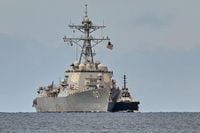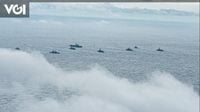Tensions in the southern Caribbean have escalated sharply in recent days, with Venezuela accusing the United States and neighboring Trinidad and Tobago of orchestrating a "false flag" operation designed to provoke a military confrontation. The allegations, which surfaced on October 26, 2025, came as the US and Trinidad and Tobago conducted joint military exercises in the region and the US Navy’s USS Gravely, a guided-missile destroyer, docked in Port of Spain, the Trinidadian capital.
Venezuelan Vice President Delcy Rodríguez announced on Sunday that the country’s security forces had apprehended a group of mercenaries allegedly linked to the US Central Intelligence Agency (CIA). According to Rodríguez, these individuals possessed "direct information" from the CIA and were plotting a false flag attack—an operation intended to make it appear as though another party was responsible, thereby triggering a broader conflict. "A false flag attack is underway in waters bordering Trinidad and Tobago or from Trinidadian or Venezuelan territory to generate a full military confrontation with our country," Rodríguez said in her statement, as reported by AFP and other outlets.
Rodríguez did not provide further details or evidence to substantiate the claims, leaving open questions about the extent and nature of the alleged plot. The timing of her announcement coincided with high-profile joint military drills between the US and Trinidad and Tobago, which Venezuelan officials denounced as a "military provocation." The Venezuelan government argued that these exercises, coordinated with the CIA, were intended to lay the groundwork for war in the Caribbean.
The US and Trinidad and Tobago have maintained that the exercises are part of a broader effort to address regional security challenges. "The partnership between the United States and Trinidad and Tobago exemplifies regional strength through collaboration. Together, we address shared threats like transnational crime and build resilience through training, humanitarian missions, and security efforts," said Jenifer Neidhart de Ortiz, the US Embassy Chargé d’Affaires, in a statement released Sunday. Both US and Trinidadian officials have insisted that the drills are routine and focused on combating issues such as drug trafficking, not on provoking Venezuela.
The USS Gravely’s arrival in Port of Spain was accompanied by reports that the aircraft carrier USS Gerald R. Ford, the newest and largest in the US fleet, had also been deployed to the southern Caribbean. The Pentagon confirmed the deployment on October 24, 2025, marking a significant show of force in the region. The US Southern Command, when pressed for comment, referred questions to the White House, while the CIA declined to issue a statement.
The military buildup follows a series of US strikes on vessels in the Caribbean and Pacific, which the Trump administration has described as part of a crackdown on narcotics smuggling into the United States. Since early September 2025, at least 43 people have been killed in these operations, according to figures released by the US government. Defense Secretary Pete Hegseth confirmed that a recent strike in the eastern Pacific killed six people, while another attack the previous night claimed two additional lives. The administration has publicly acknowledged ten such strikes targeting alleged drug-smuggling boats in both the Caribbean and Pacific regions.
The US has justified these actions as necessary to combat transnational crime, but critics—including Venezuelan officials, international experts, and even some US allies—have warned that the strikes may violate international law and risk further destabilizing the region. Slovenian President Nataša Pirc Musar, who previously served as First Lady Melania Trump’s lawyer, told Newsweek that the US could "risk losing its international credibility by continuing its strike campaign on the alleged narcotics vessels." The United Nations and other international observers have echoed these concerns, urging restraint and dialogue.
For its part, Venezuela has repeatedly accused the US of seeking to manufacture conflict as a pretext for intervention. President Nicolás Maduro, who faces a $50 million US reward for information leading to his arrest on drug and corruption charges, has long claimed that Washington is plotting to overthrow his government. Earlier in October, Maduro accused the US of planning to plant explosives at the US Embassy in Caracas—another alleged false flag plot. Maduro condemned the recent US military deployments, calling them an attempt to "fabricate a new eternal war" against Venezuela. In a rare move, he also released an appeal for peace in English, signaling his desire to avoid escalation while remaining defiant.
The political context is fraught with mistrust on all sides. President Donald Trump confirmed earlier this month that he had authorized the CIA to conduct covert operations in Venezuela, a revelation that has only heightened Caracas’s suspicions. The US, along with many European and Latin American countries, does not recognize Maduro as the legitimate winner of Venezuela’s July 2024 election. Meanwhile, prominent US lawmakers have weighed in with stark warnings for the Venezuelan leader. "If I was Maduro, I’d head to Russia or China right now," Florida Senator Rick Scott told CBS News’s 60 Minutes on Sunday. South Carolina Senator Lindsey Graham added on Face The Nation, "The game is changing when it comes to drug traffickers and drug cartels. We’re going to use military force like we have in the past to protect our country."
Trinidad and Tobago, for its part, has sought to downplay the tensions, emphasizing its longstanding ties with Venezuela. The government stated that it had been transparent about the purpose of the military exercises and "valued its relationship with the people of Venezuela given our shared history and close fraternal relations." Yet, the optics of US Marines training with the Trinidad and Tobago Defense Force, especially as the USS Gravely loomed in the harbor, have not gone unnoticed in Caracas.
Despite the saber-rattling and mutual accusations, most experts believe a full-scale US invasion of Venezuela remains unlikely. However, the risk of miscalculation is real, especially with so many military assets concentrated in a volatile region and political rhetoric running high. Observers suggest that Washington may be seeking to pressure Maduro’s government and signal support for regime change, rather than preparing for direct intervention.
As the situation unfolds, the international community is watching closely, wary of any incident—accidental or otherwise—that could spark a wider conflict. For now, the shadow of a "false flag" operation hangs over the Caribbean, a chilling reminder of how quickly local disputes can escalate on the world stage.
With both sides trading accusations and military posturing intensifying, the southern Caribbean finds itself once again at the center of a geopolitical storm—one with potentially far-reaching consequences for the region and beyond.


